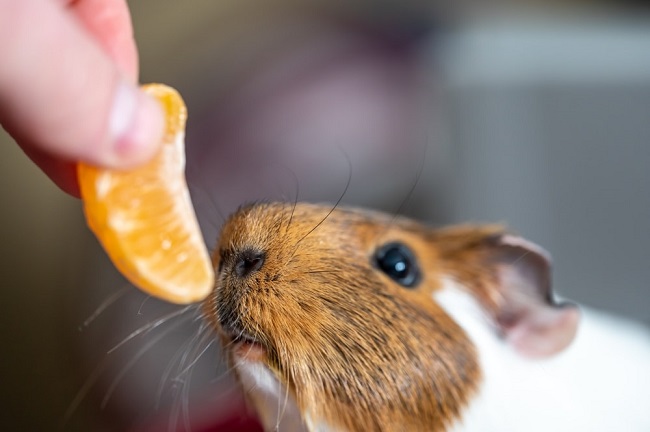As a guinea pig owner, you’re likely curious about the best foods to include in your pet’s diet. You might find yourself wondering, “Can Guinea Pigs Eat Oranges?”
In this comprehensive guide, we delve deep into this question, examining the benefits and potential downsides of feeding oranges to your little cavy, along with the role of fruits in their overall nutrition.

Understanding Guinea Pig Nutrition
Before tackling the question of oranges, let’s understand the basic dietary requirements of guinea pigs. These small mammals primarily thrive on a diet of high-quality hay, supplemented with a variety of fruits, vegetables, and guinea pig pellets.
Read Also:
Vitamin C is a crucial nutrient for guinea pigs as they, like humans, cannot synthesize it naturally. Therefore, incorporating Vitamin C-rich foods into their diet is essential.
Can Guinea Pigs Eat Oranges?
The short answer is yes, guinea pigs can eat oranges. As a rich source of Vitamin C, oranges can be a beneficial addition to your guinea pig’s diet. This vitamin aids in preventing scurvy, a common health issue in guinea pigs, and supports overall immune function.
Benefits of Feeding Oranges to Guinea Pigs
Besides the obvious benefit of providing Vitamin C, oranges offer other advantages:
Hydration: The high water content in oranges helps keep your guinea pig hydrated, especially during warm weather.
Fiber: Oranges provide dietary fiber, essential for healthy digestion in guinea pigs.
Precautions When Feeding Oranges
While oranges can be a healthy treat, there are some important precautions:
Sugar Content: Oranges are high in sugar, which can be harmful to guinea pigs in large amounts. Therefore, oranges should only be offered as an occasional treat, not a dietary staple.
Acidity: The citric acid in oranges might cause mouth sores or digestive upset if consumed excessively.
Orange Peel: Though the peel is safe and packed with nutrients, it can carry pesticides or wax coatings. If you decide to feed your guinea pig the peel, ensure it is thoroughly washed and comes from an organic source.
Serving Oranges to Guinea Pigs: Best Practices
If you choose to feed your guinea pig oranges, follow these tips for the best experience:
Portion Size: A small segment of an orange is sufficient for a guinea pig. Remember, moderation is key.
Frequency: Offer oranges as an occasional treat, ideally no more than once a week.
Monitor Your Guinea Pig: Keep an eye out for any adverse reactions, such as diarrhea, mouth sores, or changes in appetite.
Alternatives to Oranges for Vitamin C
While oranges are a good source of Vitamin C, they are not the only option. Other fruits and vegetables that are safe for guinea pigs and high in Vitamin C include bell peppers, strawberries, kiwi, and leafy greens like kale and parsley.
The Role of a Balanced Diet
While fruits like oranges can be a nutritious treat, the staple of a guinea pig’s diet should be high-quality hay, which provides the necessary fiber for their digestive system.
Supplement this with a variety of vegetables and a small number of pellets designed for guinea pigs. Treats, including fruits, should make up no more than 10% of your pet’s daily food intake.
Read Also:
Conclusion
So, Can Guinea Pigs Eat Oranges? Absolutely, but with care and moderation. As with all aspects of pet care, understanding your guinea pig’s nutritional needs and watching for individual reactions is crucial.
A varied diet, dominated by hay but supplemented with vitamin-rich fruits and vegetables like oranges, will keep your cavy happy and healthy.
























